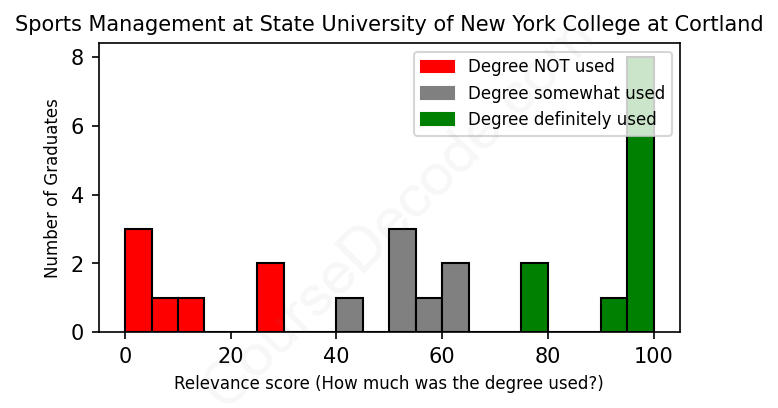
First, some facts. Of the Sports Management graduates from State University of New York College at Cortland we've analyzed , here's how many have used (or NOT used) their degree in their career:

These are estimates based on AI analysis of 25 LinkedIn profiles (see below).
The verdict? Below average. Overall, with an average relevance score of 59%, Sports Management graduates from State University of New York College at Cortland have a lower likelihood (-8%) of finding work in this field compared to the average graduate across all fields:
And for comparison, here's the chart for all profiles we've looked at across all degrees.
Also, after graduating, only 20% of these graduates have pursued further education other than another Bachelor's degree (such as a Masters degree or other), compared to the average across all profiles of 35%. This suggests a Bachelors degree is enough for most Sports Management graduates, and it's normal to look for work straight after graduation.
See the details:
|
Relevance score: 52% We think this person has gone into a career only somewhat relevant to their degree. We think this person has gone into a career only somewhat relevant to their degree.
DEGREE INFOGraduated in 2016 from State University of New York College at Cortland with a Bachelor's degree in Sports Management. No other secondary education since. JOB HISTORY SINCE GRADUATIONTicket Sales Intern Syracuse Chiefs Jan 2016 - May 2016 B.U.C.S Academy Sales Associate  Pittsburgh Pirates Oct 2016 - Jul 2017 Client Service Representative  Viacom Jul 2017 - Nov 2018 Sales Planner  Cadent Dec 2018 - Jan 2021 Cable and Broadcast Planning Director  Cadent Jan 2021 - Jan 2024 Account Executive  Cadent Jan 2024 - Present ABOUTNo information provided. |
The top 10 most common jobs done by the graduates we've analyzed (ranked most common to least) are:
When looking at the career paths of graduates from the Sports Management program at the State University of New York College at Cortland, a variety of roles in the sports industry surface, some of which align well with their degree. The most common types of jobs among these graduates include positions related to ticket operations, event coordination, and athletic communications. For instance, many of them take on roles like Ticket Operations Manager at various sports teams or work in athletic departments where they handle game day operations and logistics. These roles are pretty direct applications of the skills and knowledge they gained during their studies, showcasing how the program prepares students for practical and relevant careers in sports management.
However, not all jobs held by graduates are closely aligned with their degree. Some individuals have ventured into roles that seem tangentially connected to sports management or are entirely unrelated, such as positions in finance, customer service, or even administrative roles with no sports context. For example, roles like a Mortgage Specialist or a Financial Analyst require skills that do not connect back to sports management principles. So, while there are clear examples of graduates applying their sports management expertise, a fair number have also drifted into fields that don't leverage their academic background, making the relevance of their degrees to their current jobs quite mixed overall.
Here is a visual representation of the most common words in job titles for Sports Management graduates (this is across all Sports Management graduates we've analyzed, not just those who went to State University of New York College at Cortland):

Graduates from the State University of New York College at Cortland with a degree in Sports Management seem to have a pretty diverse set of career paths, but many of them stay connected to the sports industry, at least in the early years after graduation. Right out of college, many land internships or entry-level positions related to sports operations, ticket sales, or athletic communications. It looks like a solid percentage find roles with colleges or professional sports teams, which is a good start in establishing a network and gaining experience in the field. For instance, roles like assistant video coordinator or various intern positions at sports teams or universities pop up frequently.
Fast-forward five to ten years, and you can see some impressive career growth among a fair number of graduates. A chunk of them stay in sports or move into related professions, taking on roles like directors of game operations or even higher management positions. Others have diversified into finance or marketing-related areas, which might initially seem a bit off course but isn't uncommon in today's job market. However, it’s also clear that some graduates have drifted into roles that aren’t directly linked to sports, such as positions in client relations or as content creators in other industries. So, while a good amount of Cortland graduates find success in sports management, there’s also a noticeable number who either pivot away from sports or take a while to find their niche. It's a mixed bag, but overall, it looks like those who stick with it can carve out some decent careers!
Hey there! So, when it comes to a Bachelor’s degree in Sports Management at a place like SUNY Cortland, it really falls right in the middle of the difficulty spectrum. The coursework covers a mix of business principles, marketing, and a few niche areas specific to sports, so if you’re passionate about sports and enjoy that blend, it can be pretty engaging. You’ll probably find some classes easier than others, especially if you’re good with numbers or enjoy group projects, but there will definitely be some challenging parts, like managing projects or understanding the business side of sports. Overall, it’s not super hard, but it’s not a walk in the park either; just be prepared to stay on top of your assignments and participate actively!
Most commonly, in the LinkedIn profiles we've looked at, it takes people 4 years to finish a Bachelor degree in Sports Management.
So, if you're diving into what these Sports Management grads from SUNY Cortland have been up to, it's a bit of a mixed bag when it comes to making decent money. Some of them have really climbed the ladder in impressive ways, especially the ones at places like Goldman Sachs and JPMorgan Chase, where they probably raked in some serious cash. Others, like the ones freelancing or working internships, might be making a decent living, but they’re not stacked by any means, especially at the beginning of their careers. Overall, there are definitely some success stories here, but expect that the early years after graduation can be more about gaining experience than filling up the bank account.
Here is a visual representation of the most common words seen in the "about" section of LinkedIn profiles who have a Bachelor degree in Sports Management (this is across all Sports Management graduates we've analyzed, not just those who went to State University of New York College at Cortland). This may or may not be useful:

Here are all colleges offering a Bachelor degree in Sports Management (ordered by the average relevance score of their Sports Management graduates, best to worst) where we have analyzed at least 10 of their graduates: